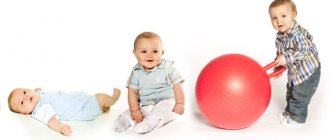At what age can children drink coffee?
First of all, we emphasize the absolute importance that children under 6 years old should not try coffee at all.
No fingers or pacifiers dipped into the cup, not even as a joke.
The caffeine contained in coffee is completely harmless for adults, while it is completely not recommended for children under six years of age who do not have the enzymes to be able to digest it.
Caffeine is actually an alkaloid and addictive substance that, when ingested by children, overstimulates the nervous and cardiac systems, acidifies the stomach, and reduces the ability to digest proteins.
Myths and truth about coffee
Before answering the question: “Can children drink coffee?”, let’s figure out how this drink affects the human body. Coffee is a natural product that contains trace elements, amino acids, vitamins and a number of substances, including tannin and caffeine. It is the caffeine contained in coffee that gives rise to the largest number of myths about this drink. It is believed that drinking coffee can lead to cardiovascular and cancer diseases, stomach ulcers and destruction of tooth enamel, cause addiction and insomnia. Fortunately, all these are nothing more than myths, and drinking coffee in moderation cannot cause such consequences.
But it’s true that coffee helps improve concentration and memory, alleviates the symptoms of allergies and asthma, improves the functioning of the gastrointestinal tract, and prevents the development of caries, some cancers, Parkinson’s disease and Alzheimer’s disease. So the conclusion of experts regarding the invigorating drink today is this: in moderate quantities (3-4 cups per day), natural coffee is beneficial for humans. But does this mean that you can safely give coffee to children?
Children try coffee from all over the world: Video
Over the age of six, you can try a drop of coffee, but do not overdo it.
If you want, you can dip your children's finger into the cup and let them taste the drop, but no further.
Of course, they will be disgusted by a taste that is too bitter for their palate and will avoid further requests. From the age of 10, you can lightly stain your breakfast milk with a few drops of coffee, but do not overdo it. A dose of approximately 1/3 cup is more than enough to color the milk and give the baby the feeling of drinking a nice, “big” drink.
Starting at age 12, you can gradually introduce coffee into your diet without increasing the recommended dose of 1 coffee per day, perhaps in the morning. With the onset of adolescence, a child's body begins to change, and its ability to absorb caffeine increases significantly.
This is definitely the best time to start introducing coffee into your diet.
The effects of coffee on children's bodies
Caffeine stimulates motor activity and reduces drowsiness
The main substance thanks to which the aromatic drink acquires familiar properties is caffeine. Its content, depending on the variety, can reach 1500 milligrams per liter. It is the stimulating effect of caffeine that enhances motor activity, increases mental performance and reduces drowsiness.
Taking into account the characteristics of the child’s body, we will consider the main aspects of the effect of coffee on children:
- stimulating effect. If for adults a certain “dose” of activity and strength is sometimes simply necessary, then the child’s nervous system (still at the development stage) may experience overstimulation. A cup of coffee will cause negative changes in the behavior of even the calmest child - irritability will appear, whims will begin for any reason, and a large portion can lead to sleep disturbances, exhaustion and overwork ;
- drinking coffee helps remove calcium from the body, which the child needs during growth and development;
- caffeine stimulates the production of sex hormones, which can have a strong negative effect on the functioning of the hormonal system, which is also at the development stage;
- Constant use of the drink is addictive, and as a result, addiction develops. For a child’s nervous system, this is a completely unnecessary test; such a habit becomes fertile ground for chronic fatigue, decreased activity and depression.
Drinking coffee affects almost all organs and systems. First of all, the work of the heart muscle accelerates, breathing becomes more frequent and the volume of urine excreted increases - such active work in a constant mode leads to rapid wear and tear of the body.
What alternatives to coffee should I give my children?
Very often parents find themselves in a difficult situation because children want to try the dishes on their parents' table and do not give in to refusal. What if children want to feel part of this magical ritual contained in a cup of creamy and enveloping coffee?
The best solution is to offer him barley coffee, which is very similar to traditional coffee. You can make a cup of coffee that makes it feel great with minimal sacrifice.
This way, even the little ones can enjoy the taste of a good cup of espresso while feeling part of the grown-up world.
Can a child drink coffee: pros and cons
Some parents start treating their children to a coffee drink as early as 7 years old. Primary school students do change quickly under the pressure of new school responsibilities. The choice of adults is quite understandable.
Coffee has a number of undeniable advantages for children:
- relieving fatigue;
- increased attention and concentration;
- improving memory and facilitating memorization;
- increasing physical endurance and reaction speed;
- mood lifting;
- adding self-confidence;
- boost of energy and ease of awakening.
There are also many pleasant bonuses: active brain function and acceleration of nervous reactions, alleviation of allergies, prevention of caries, improved digestion, reduced exposure to radiation.
What remains on the surface is a cheerful, satisfied schoolboy, ready to move mountains. And all the child needs is a cup of coffee...

However, neurologists, pediatricians, nutritionists, and endocrinologists speak out strongly against enriching children's diets with caffeine. What is the reason for such concern and why should a child not get involved in Arabica?
The dangers of coffee for children are quite varied:
1. The drink weakens the nervous system.
Does your child have frequent mood swings? Does he swing from complete loss of strength to excessive activity? It's time to sound the alarm. The above may be symptoms of hyperactivity or distraction. However, if frequent drinking of coffee coincides with these changes, you need to remove the “invigorating medicine” from your diet. There is an imbalance in the nervous system.
2. Coffee is addictive.
For adults, this fact is a topic of constant jokes. Indeed, the coffee drink affects the pleasure centers in the brain, which leads to the requirement for new constant “doses”.
However, it is more difficult for children to control their addictions, especially during adolescence. Their depression from the reduction in coffee supplies is deeper: irritability, depression, fatigue. Therefore, the child will begin to look for similar stimulants. The alternatives are clear without explanation.
3. Provokes false waste of energy.
Artificially increasing a child's excitability can have unpleasant consequences. First, we get an active, smart, cheerful baby. But after 3-4 hours the “spell” disappears, the child’s body relaxes. A reverse reaction is triggered: loss of strength, absent-mindedness, hysterics, causeless laughter. Thus, the entire daily energy supply is spent in a few hours.
4. Removes calcium from the body.
It’s not without reason that marketers put “fortified calcium” in children’s food products. This trace element is very important for the healthy growth of children. The whole problem is the diuretic properties of coffee: minerals (zinc, phosphorus) are washed out of the body with the liquid.

5. Enrages cardiologists.
A danger that is invisible but significant
Sometimes a child’s interest in this drink develops under the influence of:
- own curiosity
- observations of our lifestyle,
- social pressure.
If everything is clear with the first two factors, then the third is the most serious and dangerous. By the way, we can also play a negative role in it if we admire and tell how good coffee is, how much we love it, how it helps us. Often parents themselves impose their admiration, trying to diversify life, thinking that the child is missing something and coffee will fill this deficiency.
The most interesting thing is that if the baby asks us to let him try at least a sip, of course, it would be stupid to refuse, otherwise he will become even more interested in what we are hiding. So, if you give it a try, believe me, the child will not like it. How can you like something bitter, strong, and incomprehensible?
He will definitely decide that this is not his! Support your little one in this. Yes, not him! And in general, it’s no one’s, because it doesn’t bring any benefit to anyone. That's all there is to a habit that binds a person, and nothing else! A ritual that draws in and does not set anyone free.
Coffee for children: pros and cons
Many people are concerned about the effect of coffee on the human body, especially children. After all, all parents want their children’s health to be out of danger.
There are different opinions about whether children should be given coffee. In this article we will look at this issue in detail.
In order to understand whether children can drink coffee and how it affects the body, it is necessary to study its composition. The main component is caffeine. It is he who gives strength and makes us more cheerful. It is important to understand that this substance belongs to the group of alkaloids, which includes quite a few different elements, including such as nicotine and cocaine. Coffee also contains:
- sucrose;
- protein;
- fiber and other substances.
The complete list of coffee components is very large; it includes hundreds of different substances. To date, only the influence of some of them on the human body is reliably known.
As we mentioned above, the main component is caffeine. Different types of coffee have different levels of this element. For example, in Arabica it is up to 2.5%. The less noble Robusta has much higher caffeine content. In grains of this variety it can be up to 3.2%.
When roasting, the ratio of substances in coffee changes: the caffeine content in beans can increase up to 20%. The stronger the heat treatment, the higher this indicator will be.
The effect of caffeine is very specific. It is able to influence the functioning of the neurohormone, which causes drowsiness. Thus, the substance improves the reaction.
Caffeine increases the production of another hormone - adrenaline. It activates the work of all vital systems of the body, so after a cup of coffee people feel a surge of strength and vigor.
Caffeine increases blood glucose levels, which also increases activity. A good mood after a cup of your favorite drink occurs as a result of the substance stimulating the production of dopamine.
It is conventionally called the “hormone of happiness.”
Coffee itself is not harmful to health. True, it increases blood pressure. People who suffer from hypertension or are prone to it should pay attention to this.
The main problem is not the caffeine itself, but the amount of it. If you drink the drink in moderation, there will be no harm to the body. At the same time, if you regularly drink large amounts of coffee, it can lead to health problems.
It should be borne in mind that regular consumption of the drink can be addictive. A healthy adult is allowed to drink up to three cups of the drink per day. With children the situation is somewhat different. The age of the child is essential.
Let's consider situations with children of different ages.
- Until the age of five, a child should not be given coffee at all. The baby’s body is still too fragile, so it is better to choose water, compote or herbal tea.
- Some parents believe that it is safe to give coffee to children over 5 years old and prepare them weak coffee with milk. This decision can hardly be called correct. since the child still has a rather weak nervous system.
- The nervous system of adolescents aged 12-13 years is also subject to serious stress. In addition, at this time the child’s hormonal changes begin. Excessive coffee consumption can cause quite serious harm. Many doctors do not recommend allowing teenagers at this age to drink it.
- There is a competent answer from doctors to the question: “At what age can a child be given coffee?” This is only permissible during puberty. Simply put, at 14-15 years old. At this time, the human body has already coped with the period of hormonal surge. But we should not forget that the child’s brain continues to form, and his heart is subjected to quite serious stress. In this regard, only very moderate consumption of the drink is permissible. If your teen doesn't show much interest in coffee, you shouldn't offer it to him.
MORE ABOUT: Headache pressing from the top of the head
So, let's summarize. The drink can be drunk by children over 14 years of age. But is it worth it? There are quite a lot of arguments against this. Below, we will take a closer look at why you should not, in principle, drink the drink at an early age.
There is a consolidated opinion among doctors about why children should not give coffee. Let's look at the risks associated with drinking the drink during adolescence.
Problem number one: caffeine seriously affects the nervous system, which at fourteen is still developing. This leads to sleep disturbances and makes the teenager easily excitable. In addition, increased production of adrenaline not only gives strength, but also exhausts the heart. The consequence may be heart rhythm disturbances and other unpleasant problems.
As we mentioned in this article, caffeine seriously increases your blood glucose levels. As a result, an imbalance in the pancreas can occur, which can ultimately lead to disruption of its function.
Do not forget that the alkaloid in question has a strong diuretic effect. As a result, excessive leaching of calcium from the body occurs. Its deficiency can lead to defects related to bone formation and slower bone growth.
The main problem with drinking the drink in adolescence is the difficulty of determining a safe dose, since the child’s body is constantly undergoing changes. It is advisable to protect your child from addiction to coffee.
If your child has already grown up and you want to instill in him a taste for good coffee, use only high-quality equipment to prepare it.
Check out our catalogue. You can rent a coffee machine from us for free. Check out our catalogue.
Coffee machines catalog
Is it possible to give children coffee?
Weighing all the pros and cons, it is the parents who decide whether to allow their child to drink coffee in certain quantities. Experts say that given the fact that the child’s body is in a state of active growth and development, it is better not to give the child coffee at all . The first “acquaintance” with this drink should occur at the age of at least 14 years.
But how can you refuse a child if he so insistently asks to taste the fragrant contents of your cup? At a certain age, children repeat everything after adults, adopting their habits and behavior patterns, and therefore, perhaps the only effective option would be to stop drinking this drink in front of the child for a while, so as not to create unnecessary temptations.
Of course, in any matter the quantity factor is very important; it is necessary to prevent an overabundance. So, if parents still decide to give their child coffee, then this should be done in small portions and very rarely - no more than once a month. Milk will help somewhat reduce the level of negative effects - you can safely dilute the drink with it.
How does caffeine work?
- It suppresses neurohormone receptors that cause relaxation and drowsiness. Therefore, reaction speed and perceptual acuity improve.
- Caffeine stimulates the production of adrenaline, so a person feels alert and energized. The activity of all body systems, including the brain, increases.
- This active substance releases glucose and stimulates its entry into the blood, which also contributes to a surge of strength and increased activity.
- Caffeine increases the level of the neurohormone dopamine, stimulating its production and release into the blood. Hence the feeling of a good mood after a cup of your favorite drink, because dopamine is one of the so-called “hormones of happiness.”
MORE ABOUT: Cloudy/dark urine in a woman.
Reasons for the smell, treatment, which doctor to see This is the kind of hormonal-chemical cocktail a person receives with every cup of coffee.
By itself, it does not cause any tangible harm to the body, except perhaps an increase in blood pressure, which may not respond very well to people with a tendency to hypertension.
The problem is not so much the caffeine itself, but the amount of it. As ancient doctors said: there is medicine in a spoon, poison in a cup. Small doses of caffeine become an excellent tonic and mild natural stimulant. Excessive amounts of caffeine lead to many unpleasant consequences for the body.
These include dehydration, tachycardia, anxiety, sleep disturbances, metabolic disorders and nervous system imbalance. This also includes developing the habit of regularly drinking coffee, and then the absence of a morning cup of your favorite drink will be perceived by the body as very painful, even to the point of developing depression.
An adult in normal health can drink 3 to 5 cups of coffee daily without harming himself.
Can children have coffee? How to prepare the drink correctly
First you need to figure it out.
Of course, at any age, even in adolescence, drinking strong drink is not recommended due to the immaturity of many systems of a child’s growing body. You should not let coffee taste from your cup - no matter how sweet and tasty it is, it has a rich, pronounced taste and can have an unpredictable effect on the baby. It is optimal to start drinking the drink (in a highly diluted form, not daily) at the age of 9-10 years, before school, during breakfast, given the invigorating effect. It's good to give children coffee with milk
, with condensed milk, with sugar, with cream to remove the strength of the drink. It should be minimal. Ideally, keep the proportions 2:1 (when adding milk, condensed milk can be used to sweeten a drink diluted with water).
At the age of 13-15, you can already allow a teenager to drink not only coffee with milk
, but also one or two cups of a weak, properly brewed drink during the day (if there are no contraindications from a doctor). At this age, the body is strong enough to perceive and absorb the beneficial properties of the drink without noticeable harm.
But there is a possibility that after trying coffee for the first time, the child’s body may unexpectedly react extremely negatively. Unpleasant consequences:
The likelihood of these symptoms is relatively low, but if suddenly the child complains, then you need to provide bed rest, drink water and wait for the doctor to arrive.
Another interesting question is: can children drink instant coffee?
? The answer is clear - absolutely not. Instant coffee in bags is a chemical surrogate that does not contain anything useful or nutritious. It consists of synthetic substances, dyes, preservatives, not recommended for adults; we are not talking about children. This drink can cause harm in the form of possible allergies, problems with the digestive system, and teeth.
Before offering your child a drink of coffee, you should familiarize yourself with the properties of the main component of the drink:
- 100 ml of real coffee without additives is about 60 mg of caffeine;
- a child can consume no more than 50 mg per day without visible harm to health;
- caffeine takes a very long time to be eliminated from the child’s body, tends to accumulate in various organs and negatively affect health;
- Caffeine is found in black tea, milk and dark chocolate, so your child can get more than their daily requirement from a variety of foods.
It's no secret that coffee is one of the favorite drinks of many women and men. Its fragrant smell, especially in the morning, attracts not only adults, but also children. However, it contains a lot of caffeine, which is not safe for children. Therefore, it is important for parents to know at what age can children drink coffee and in what quantity? What side effects may occur from regular consumption of this drink. So, let's figure it out.











